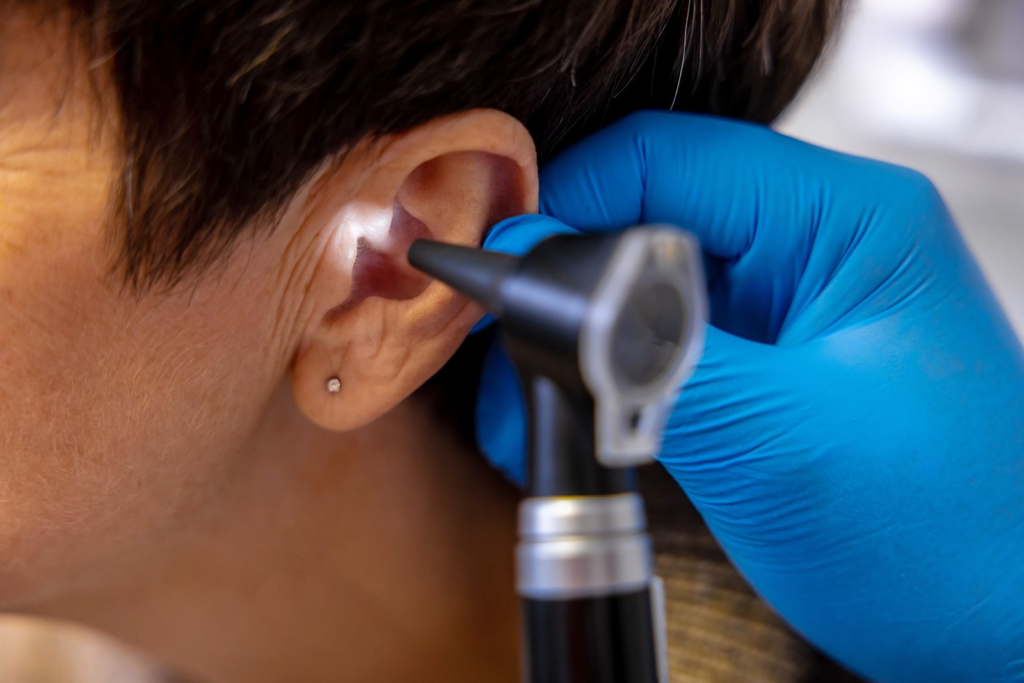Hearing Aids Reduce Dementia Risk 2023

A comprehensive study published in The Lancet Public Health on April 13 found that hearing aids may lessen dementia risk in hearing-impaired people.
Hearing aid users had no increased dementia risk, while those without hearing aids did.
According to corresponding author Dongshan Zhu, PhD, a postdoctoral researcher at Shandong University in Jinan, China, hearing loss may be the most significant modifiable risk factor for dementia in midlife, but the real-world effects of hearing aid use on dementia risk remain unclear.
“Our study provides the best evidence to date that hearing aids could be a minimally invasive, cost-effective treatment to mitigate the potential impact of hearing loss on dementia,” says Dr. Zhu.

The Dementia-Hearing Loss Connection
According to the National Institute on Deafness and Other Communication Disorders, 1 in 3 Americans 65–74 and over half of those 75 and older have hearing loss.
Alison R. Huang, PhD, MPH, an epidemiology researcher at the Johns Hopkins Bloomberg School of Public Health in Baltimore, studies the effects of sensory loss on cognitive and mental health in older adults. This study did not involve Dr. Huang.
Huang suggests three theories linking hearing loss to dementia.
“First, with hearing loss, speech and sound are heard as garbled by the time they reach the brain,” she explains. Huang believes this reduces brain resources for memory and executive function, which can contribute to cognitive decline.
She says hearing loss understimulates speech and sound-stimulated brain regions, which can cause atrophy and brain alterations.
Finally, hearing loss can make speaking with people harder, which can lead to social isolation, another dementia risk factor, says Huang.

Hearing Loss Without Hearing Aids Increased Dementia Risk.
Researchers used U.S. Biobank data from over 430,000 persons. Self-reported surveys collected hearing loss and hearing aid use, and hospital records and death register data diagnosed dementia.
Participants were 56 years old and followed for 12 years when the study began. 25% had hearing loss, whereas 75% did not.
1 in 8 hearing-impaired people utilized hearing aids. Researchers adjusted for many dementia risk factors, including education, ethnicity, income, alcohol use, depression, social isolation, and chronic diseases.
Hearing aid users had no elevated risk of all-cause dementia, but non-users had a 42% greater risk.
People with hearing loss who did not use hearing aids had a 1.7 percent absolute risk of dementia, compared to 1.2 percent for those without hearing loss or those who used hearing aids.
Hearing aid users may have healthy habits.
Huang praises this study’s huge sample size and longitudinal approach (examining a variable, dementia, over several years). “While the authors’ findings regarding hearing aid use and dementia risk are encouraging, it is still difficult to disentangle whether what we’re seeing is due to the hearing aid or other factors,” she adds.
Huang notes that just 12% of this cohort’s self-reported hearing loss sufferers used hearing aids, which may be linked to other health-promoting characteristics like access to healthcare that lower dementia risk.
Zhu acknowledges that hearing aid users may be taking better care of their health than non-users, even though the study controlled for many factors.

According to the Hearing Loss Association of America, 20% of Americans with hearing loss use hearing aids.
RCTs Needed to Confirm Results
Huang says, “but more research is needed, particularly from randomized controlled trials.” These findings are encouraging and consistent with a late 2022 JAMA Neurology meta-analysis that found a lower risk of cognitive decline in older adults with hearing loss who use hearing aids.
The study authors believe that those trials are needed to confirm the relationship between hearing aids and dementia risk. “This study is observational, the association between hearing loss and dementia might be reverse causation through neurodegeneration or other shared mechanisms,” adds Zhu.
The authors also noted that variety limits the findings. According to a journal article, 95% of UK Biobank participants are white, and few were born deaf or had hearing loss before learning spoken language, which may limit the findings’ applicability to other ethnicities and sign language users.

Will Hearing Tests and Aids Prevent Dementia?
Without a hearing test, many people may not realize they have hearing issues. Huang believes consulting an audiologist for a hearing test every 1–2 years is reasonable. She notes that your insurance may require a doctor’s referral to see an audiologist.
Smartphones can be used to self-test hearing. “Our Johns Hopkins Cochlear Center for Hearing and Public Health website guides people through this,” she explains.
Huang says randomized trials are needed to evaluate if hearing aids lower dementia risk in adults with hearing loss.
She claims the National Institute on Aging-funded ACHIEVE research is doing that. Nearly 1,000 older persons in their 70s and 80s with mild-to-moderate hearing loss were randomly allocated to either a hearing intervention or a healthy aging education control intervention and observed for three years.
This trial will show if treating hearing loss slows cognitive decline. Huang expects trial results later this year.
